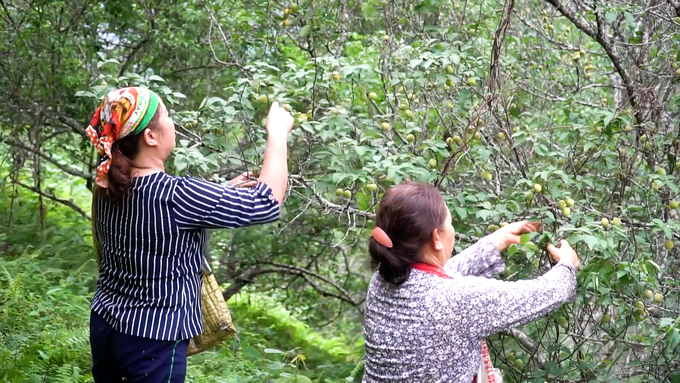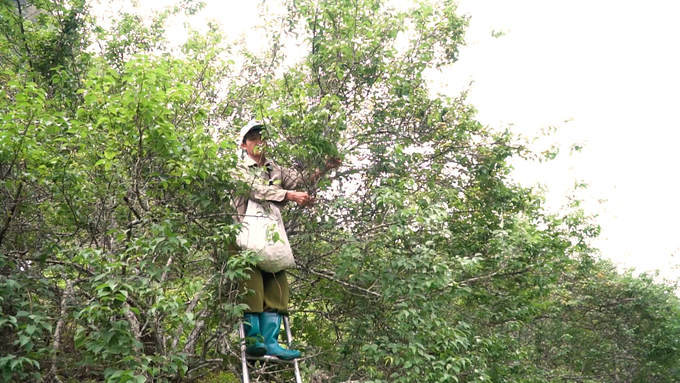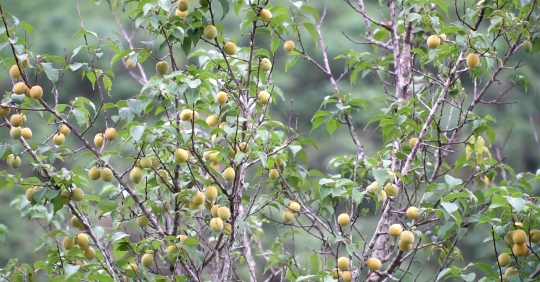Mr. Ha Quang Duong’s family in Cao Ky Township, Cho Moi District (Bac Kan) owns more than 5 hectares of apricot trees (mainly yellow apricot trees), almost half of which have been planted since 1995. In recent years, apricots have been cultivated.. get the price, each family earns several hundred million dong.
Mr. Duong said that the family grew and nurtured apricot trees from experience, in addition to reading more guidance from books and newspapers. Apricot plants have also gradually gotten old in recent years, yield and quality are not as good as they used to be.
According to a recent survey, in Bac Kan province, most of the yellow apricot trees were planted 20-25 years ago, varieties of unknown origin, mainly seeded and sown with many different varieties.
Apricot farmers lack knowledge of apricot planting and care techniques and little access to new technical advances.

Many apricot orchards in Bac Kan are old and need technical measures to improve productivity. Picture: Ngoc Tu.
Every year, most people do not perform pruning, canopying, tending, fertilizing and watering apricot trees according to the technical procedure.
For a long time, households grew apricots mainly from experience, so they often suffered from severe pests and diseases, resulting in low productivity, low quality and poor design of the apricots.
Especially since 2015 and earlier, the price of apricots has been low, so many apricot orchards have been abandoned. Now that the price is high, it is being renovated, but the productivity is low.
In view of this situation, Thanh Tay Agro-Forestry Technology Research and Development Institute (hereinafter referred to as the Institute) has carried out the project “Application of Science and Technology in the Selection of Elite Trees and the Development of Yellow Apricot Trees” in Bac Kan Province”.
This project will renovate 31 ha of yellow apricot trees in Cao Ky Township (Cho Moi District) with 15 ha; Don Phong Municipality (Bach Thong District) 10 ha; Xuat Hoa District (Bac Kan City) more than 6 ha.
In the refurbished models, people carry out annual pruning, fertilizing, spraying pesticides and using a series of safe production products according to the institute’s procedure.
After the renovation of the apricot garden, care measures such as fertilizing, watering, pruning after harvest are continued every year.

The results of the project will help local offspring to improve low-yield apricot orchards. Picture: Math Nguyen.
After an implementation phase, the results showed that the modified apricot tree model had a superior yield compared to the untreated apricot tree in the control model.
Specifically, an apricot tree in the improvement model ranges from 67 to over 74 kg/crop, the average yield is 13 to 15 tons/ha. Meanwhile, on unimproved plots, each tree only achieves around 30 kg/crop, yielding around 7 tons/ha.
In addition, the yellow apricot variety in the improved model has a selling price higher by about VND 3,000/kg than the unimproved apricot tree because the fruits are large, uniform and better shaped.
Ngo Hong Binh (Project Manager) said that practical implementation has shown that after rehabilitation, thanks to the application of pruning and pruning techniques, apricot trees have a superior yield compared to non-improved apricot trees.
Mr. Dong Phuc Toan, Chairman of the People’s Committee of Cao Ky Township (Cho Moi District), assessed that the renewal of the yellow apricot trees has resulted in higher yields, good fruit quality and beautiful design. The apricot tree is the main culture of the community, so the results of the project are very favorable conditions for the place to continue replicating for people to apply.
The project also selected 35 excellent yellow apricot seedlings in Cao Ky Township, Cho Moi District. According to the monitoring results, the yield of 35 elite apricot trees for 3 consecutive years (from 2016 to 2018) was high and fairly stable (in 2016 it was 60-85.5 kg/tree; in 2017 it was 65.4-90.3 kg/ tree and reached 80.1 – 99.3 kg/tree in 2018).
Based on this, Thanh Tay Agro-Forestry Technology Research and Development Institute proposed the site to propagate yellow apricots from 35 elite trees selected by the project to serve in production in the near future.

